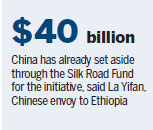Chinese initiative boosts integration
Ethiopia is among the first African countries interested in the strategy
ADDIS ABABA, Ethiopia - The Belt and Road Initiative is a golden opportunity to bring about regional integration and sustainable economic growth for Africa, said Berhane Gebre-Christos, special envoy of the Ethiopian prime minister, on Tuesday.
The envoy made the remarks at the opening of a seminar organized on the initiative in Ethiopia's capital Addis Ababa.
Welcoming the initiative, Gebre-Christos said he is looking forward to the expected effects of the initiative.
"The initiative is a project that will affect millions of people, and it will be one of the most important issues of the 21st century," he said, adding that the comprehensive approach of China means that the aspirations and development strategies of all countries involved will be considered and included in the initiative.

Speaking on the occasion, La Yifan, Chinese ambassador to Ethiopia, said that the seminar was organized as part of preparation for an upcoming Belt and Road Initiative forum scheduled for next month in Beijing.
The ambassador noted that the forum in Beijing would review the achievements made since the announcement of the initiative and would deliberate on the way forward.
La said that China has already set aside $40 billion through the Silk Road Fund for the initiative, and $30 billion through the Asian Infrastructure Investment Bank.
Export-oriented
Ethiopia was among the first in the continent to show interest in the initiative. The East African nation will rely heavily on infrastructure investment to transform its low-income agrarian economy to a medium-income, export-oriented economy by 2030.
Ethiopian State Minister of Foreign Affairs, Hirut Zemene, hailed the Sino-Ethiopian overall partnership, and cooperation in infrastructure development in particular, such as the Addis Ababa light rail and the Ethiopian-Djibouti rail projects.
She had high expectations for the initiative, expressing belief in its capacity to affect structural transformation in Ethiopia and across Africa.
While the trade aspects of the initiative have been given high hopes, some stressed that the soft power of the initiative should also not be ignored.
Melaku Mulalem, head of the Foreign Policy Analysis Department, at the Ethiopian Foreign Relations Strategic Studies Institute, said that as China-Africa trade volume is expected to reach $400 billion by 2020, there will be a need for skilled manpower to handle the changes.
China gives 10,000 scholarships annually to African students, which, according to Mulalem, is not enough.
Mindful of the gap, China established last year an Institute of South-South Cooperation and Development under the Peking University.
ISSCD is an educational program for officials of developing nations with an aim of helping them make a difference in their home countries after their studies. Currently, 48 students are enrolled in the institute.



























